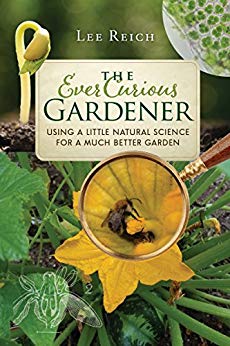Curious About Plants
George Graine, Fairfax Master Gardener
“A garden is a grand teacher. It teaches patience and careful watchfulness; it teaches industry and thrift; above all, it teaches entire trust.”
—Gertrude Jekyll (1843-1932)
Many books extol the virtues of landscape design as a form of art; however, it is unusual to find a book that discusses gardening from a scientific perspective. Can the two be combined? Of course they can! Dr. Lee Reich, a horticulturist and scientist, has ably melded gardens with science in his new book, “The Ever Curious Gardener: Using a Little Natural Science for a Much Better Garden” (New Society Publishers, 2018).
 Please do not get turned off by the word “science” in the title. After all, every time you purchase a bag of fertilizer, you will see three numbers on the bag that indicate the chemicals nitrogen, phosphorous and potassium. Some fertilizers may also indicate other chemicals that are nutrients known to help plants to thrive and survive. In this instance, chemicals are part of the landscape equation.
Please do not get turned off by the word “science” in the title. After all, every time you purchase a bag of fertilizer, you will see three numbers on the bag that indicate the chemicals nitrogen, phosphorous and potassium. Some fertilizers may also indicate other chemicals that are nutrients known to help plants to thrive and survive. In this instance, chemicals are part of the landscape equation.
Reich takes you on a trip through your garden and provides easy to understand explanations of perceived mysteries. He tells you what happens when you garden as if it is a huge experiment. \Most important, he helps you understand how to garden with greater success. In other words, Reich provides practical advice that piques your curiosity. He helps you to understand how and why plants respond to your stewardship as gardeners. He stresses that “gardens are variable and complex ecosystems which makes growing plants both interesting and, if you want to know why a plant did what it did, frustrating.”
Reich’s book is “not a comprehensive overview of botany and related sciences, just the natural science that can be applied in the garden.” Furthermore, you can randomly browse chapters that most interest you. Each chapter stands by itself and provides the rationale for what is happening in your garden. With minimal effort and know-how, you can have a decent garden.
After reading this book, you will become a better gardener because you will have an increased understanding of why your garden looks better. Combining scientific knowledge with your previous gardening knowledge will definitely improve your gardening experience. Once you have a better scientific understanding of your garden, you will become a better observer of each plant whether it is a flower, shrub, vegetable and more.
Each chapter begins with a few opening remarks that set the stage for an interesting discussion. The author’s words are like a conversation with you, the reader. Reich makes gardening interesting as he explains what lies beneath your feet and how the sun interacts with plants. Note that in addition to being an informed read, this book also has its humorous side as well.
Below are Reich’s introductions to each chapter in the book. Throughout each chapter are symbols of magnifying glasses that provide more insights germane to the chapter.
- Chapter 1 – Propagation and Planting: A lot of deception helps me get some seeds to sprout that under natural conditions would wisely stay asleep.
- Chapter 2 – Soil: In which we watch the progress of water traveling though soil, with methods to, at the same time, speed it up and slow it down.
- Chapter 3 – Flowering and Fruiting: Sex is introduced and its sometime importance is emphasized.
- Chapter 4 – Stems and Leaves: In which my thumbnails, pruning shears, and branch bending coax plants into bushiness, lankiness, or anything betwixt.
- Chapter 5 – Organization: Wherein families migrate together around my garden and for good reason.
- Chapter 6 – Stress: On steps, human and otherwise, to avoid the havoc of icy cells during frigid temperatures.
Chapter 7 – Senses: In which I elucidate, abet, and alter the color of leaves, vegetables, and flowers.
In summary, after reading this book you will develop a better understanding of the science behind success with your plants. Dr. Reich writes in a pragmatic way. Throughout the book he dispels some gardening myths, although not necessarily referring to them as such. You will be amused by his personal experiences and how he reduces them to humorous explanations. In other words, be curious – it is good for your plants.